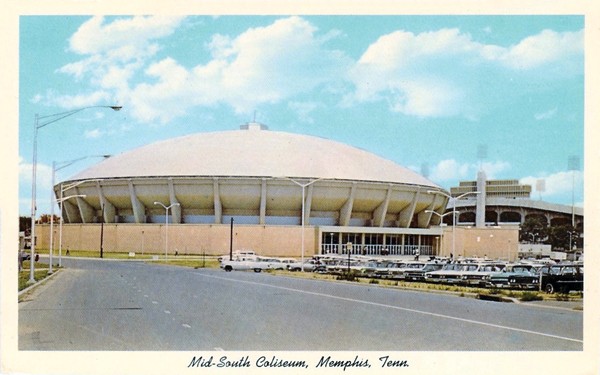The long-vacant arena that once hosted the Beatles, Eric Clapton, Elvis Presley, and other noteworthy musical acts may face demolition if the Mid-South Fairgrounds is granted Tourism Development Zone (TDZ) status.
Mike McCarthy, a local filmmaker, has become a vocal advocate for the Mid-South Coliseum, and he helped establish a Facebook group devoted to saving the historic 10,085-seat arena.
McCarthy has a soft spot for the Coliseum, as they share a birthday.
“The Mid-South Coliseum was built to have longevity, not to exist within the lifespan of one person,” McCarthy said. “The infrastructure of the building is sound. It’s a unique structure that speaks to Memphis history.”
In December, the Shelby County Commision put off any action on considering possible TDZ status for the Mid-South Fairgrounds at the request of Mayor A C Wharton. They’re expected to take the issue up again this month. If granted, TDZ status would use excess sales tax from businesses in Cooper-Young, Overton Square, and other areas within the three-mile zone to repay bonds used to fund construction of athletic fields, retail space, a hotel and residential units on the Fairgrounds property.
One of the hurdles to saving the Coliseum has long been the cost to get the building into compliance with the American Disabilities Act, but some proponents of saving the Coliseum have expressed doubt over previous studies projecting the costs for retrofitting.

Another hurdle is FedExForum’s non-compete clause that does not allow another 5,000-seat venue to compete with the Grizzlies arena. That was an issue when the Coliseum began operating at a loss in the early 2000s. This has raised questions for folks like McCarthy, who wonder how much tax revenue has been lost due to the non-compete clause.
Marvin Stockwell, who works for the Church Health Center (CHC), is close to the effort as well. He said the renovation of the Sears Crosstown building, where the CHC is moving its operations soon, should be a testament to what the city could do with salvageable structures.
“The public has not had a chance to weigh in on what they’d like to see happen at the Fairgrounds,” Stockwell said. “I’ve spent a lot of my time over the past two years thinking about the renovated Crosstown building. You want to talk about a process that invited multiple ways of public input, such that the public would have a chance to be consulted and say, ‘This is what we think we want in the Crosstown neighborhood.'”
Advocates of saving the Coliseum have started a petition that, as of press time, has more than 2,600 signatures. They’re aiming for 3,000 by January 10th.
“The next administration is going to scrap whatever someone else did and create the new thing,” McCarthy said. “There’s never going to be any permanency. Things are always in flux, but the Coliseum can be a historical anchor for anything that occurs over there. The Liberty Bowl and the Coliseum were created as sister structures. [Out of] the $233 million that gets dumped over there, a small fraction can be used to save the building.”